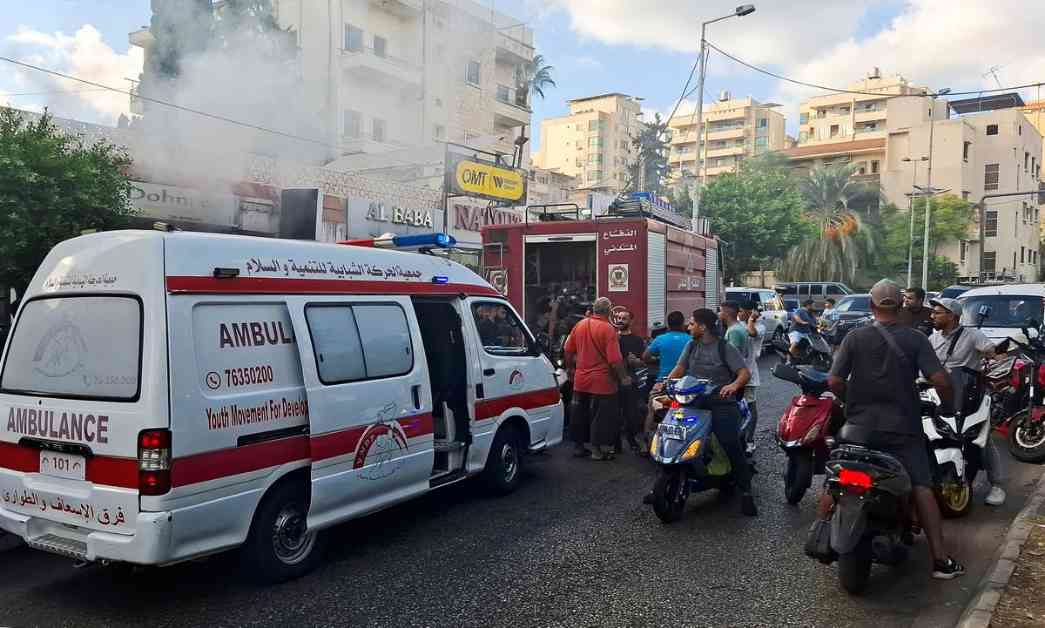At least nine people were killed and over 300 injured in Lebanon after hand-held radios used by the militant group Hezbollah detonated late on Wednesday afternoon. The explosions occurred across the country’s south and in the southern suburbs of the capital Beirut. One of the blasts took place near a funeral organized by Hezbollah for those killed the previous day when thousands of pagers used by the group exploded.
Lebanon’s health ministry reported that nine people have died and 300 others were wounded in the blasts. Many of the injuries were to the stomach and hands, according to local media sources. The state-run National News Agency also reported several explosions of old “pager devices” in Beirut, southern Lebanon, and the eastern city of Baalbek during funeral processions for Hezbollah members.
Israel, who was blamed by Hezbollah for the previous day’s blasts, has not yet commented on the explosions. However, following the latest blasts, Israel’s defense minister declared a “new phase” of the war as the army turned its attention to the northern front with Lebanon.
Tensions in the region continue to mount as Iran condemned the explosions as “terrorism” and blamed Israel for the death and injury of hundreds of Lebanese civilians. The Lebanese military urged people not to gather in areas where the incidents were taking place as medical teams tried to reach the affected areas.
Hezbollah announced on Wednesday that they had attacked Israeli artillery positions with rockets in retaliation for the previous day’s blasts. The Israeli foreign ministry reported air raid alarms sounding in northern Israel, with smoke seen over western Galilee. Since October, there have been repeated exchanges of fire between Hezbollah and the Israelis, with more than 8,000 rockets fired at northern Israel and Israeli retaliatory strikes in Lebanon.
Israel’s Mossad spy agency was accused of planting explosives inside thousands of pagers imported by Hezbollah months before they detonated. The operation resulted in the death of 12 people, including two children, and the injury of nearly 2,750 others. The pagers were said to be from Taiwan-based Gold Apollo, but the company denied manufacturing the devices, stating that they were made by a company called BAC with a license to use their brand.
Hezbollah has vowed to retaliate against Israel for the attacks, while Israel’s military has remained silent on the matter. The ongoing tensions between the two sides have raised concerns about the potential for a wider conflict in the Middle East.
Explosions in Lebanon
The explosions of the walkie talkies used by Hezbollah have caused chaos and devastation in Lebanon. The scenes of destruction in the country’s south and the southern suburbs of Beirut are a stark reminder of the ongoing conflict in the region. The loss of life and the significant number of injuries highlight the toll that these explosions have taken on the Lebanese people.
The fact that these explosions occurred during funeral processions for Hezbollah members killed in the previous day’s blasts adds another layer of tragedy to the situation. The violence and instability in Lebanon have only been exacerbated by these incidents, further fueling tensions between Hezbollah and Israel.
Response from Iran and Israel
Iran’s condemnation of the explosions as “terrorism” and its accusations against Israel for the death and injury of Lebanese civilians underscore the complex dynamics at play in the region. The finger-pointing between Iran, Hezbollah, and Israel only serves to escalate the situation and raise the specter of further violence.
Israel’s defense minister declaring a “new phase” of the war and the military’s attention turning to the northern front with Lebanon signal a potentially dangerous escalation of hostilities. The rocket attacks on Israeli artillery positions by Hezbollah in retaliation for the explosions further heighten the risk of a broader conflict erupting in the Middle East.
Security Breach and Retaliation
The revelations about the Mossad spy agency’s alleged involvement in planting explosives inside the pagers used by Hezbollah shed light on the intricate and shadowy world of espionage and covert operations. The security breach that led to the detonation of thousands of pagers across Lebanon has had devastating consequences, with innocent civilians paying the ultimate price.
Hezbollah’s vow to retaliate against Israel for the attacks underscores the group’s determination to defend itself and its allies. The ongoing exchanges of fire between Hezbollah and the Israelis have created a volatile and dangerous situation that threatens to spiral out of control if not addressed swiftly and decisively.
In conclusion, the explosions of the walkie talkies used by Hezbollah in Lebanon have had far-reaching and devastating consequences. The loss of life, injuries, and destruction caused by these blasts highlight the urgent need for a peaceful resolution to the conflict in the region. The accusations and counter-accusations between Iran, Hezbollah, and Israel only serve to further inflame tensions and increase the risk of a wider conflict erupting. It is imperative that all parties involved exercise restraint and work towards a peaceful and diplomatic solution to avoid further bloodshed and suffering in Lebanon and the broader Middle East.











